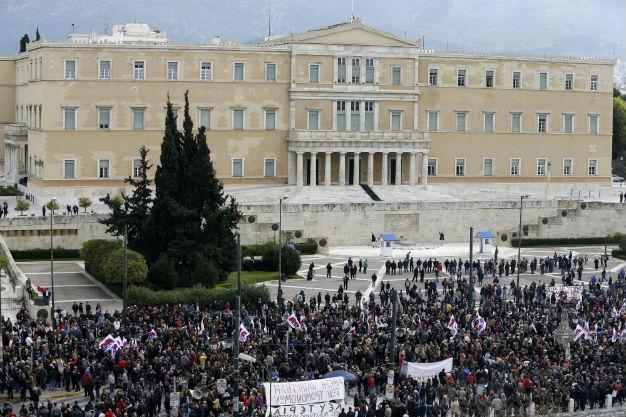National strike over pension reforms paralyses parts of Greece
ATHENS – Reuters

AP photo
Parts of Greece came to a standstill on Feb. 4 as thousands of people went on strike over pension reforms pursued by the leftist-led government to meet conditions set by international lenders to rescue the debt-crippled country.
Testing the resolve of Prime Minister Alexis Tsipras as he clings to a slim majority in parliament, Greeks rallied around the country to demand he rescind a plan to tighten the social security system that many fear will push them deeper into poverty.
“They should be strung up here, in Syntagma Square,” said pensioner Nikos Ghinis as he walked along with thousands of others in central Athens. “I’m getting 740 euros ($826.21) a month for 40 years of work...I’m (demonstrating) here for my children and grandchildren,” he told Reuters.
Dozens of domestic flights were grounded, ferries remained docked in ports and most public transport was paralyzed as part of the strike organized by Greece’s main labor unions, private sector union GSEE and public sector union ADEDY.
Thousands of people ranging from ship workers and doctors to musicians and owners of funeral parlors started rallying in central Athens. “If we don’t react they will finish us off,” funeral parlor owners said in a statement.
They planned to march to parliament, intensifying pressure on a beleaguered government struggling to convince lenders it is committed to the terms of its third bailout without losing its thin majority in parliament.
It was the second nationwide walkout since Tsipras took power in January 2015 on a pledge to end years of austerity, only to cave in under the threat of expulsion from the euro zone and sign up to new belt-tightening reforms under an EU-IMF bailout package worth up to 86 billion euros.
The 24-hour strike coincides with a major review of Greece’s performance on terms of its bailout. The heads of the European Union and International Monetary Fund mission assessing Greece’s progress arrived in Athens earlier this week to discuss the pension plan, tax reforms and bad loans weighing on Greek banks.
The government wants to conclude the review swiftly to start talks on debt relief and convince Greeks that their sacrifices are paying off despite the jobless rate rising to 25 percent.
Greece must cut pension spending by 1 percent of GDP, or 1.8 billion euros, this year. To protect retired people whose pensions have been slashed 11 times already since 2010, the government plans to increase social security contributions by employees and employers.
But unions say the new plan will increase unemployment as the costs for hard-pressed businesses will go up, and will force workers, mainly the self-employed, into tax evasion as it links social security contributions to declared income.
“We cannot live, we cannot survive with what the government is asking from us,” said farmer Socratis Aleiftiras, among thousands of farmers who have blocked roads across Greece for the past two weeks.
Under the terms of pension reform, their social security contributions will increase almost threefold in coming years.
Although the measures, which include the gradual phasing-out of a pension benefit by 2019, are broadly in line with bailout demands, sources close to the lenders said they may not be enough to address a deeper-than-expected fiscal gap.
